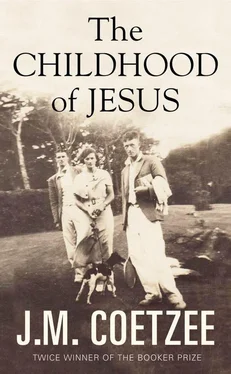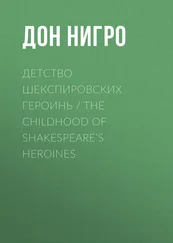Elena does not reply but calls Fidel into the room. ‘Fidel, darling, tell us about señor León. David and he don’t seem to be getting on together, and Simón is worried.’
‘Señor León is OK,’ says Fidel. ‘He’s strict.’
‘Is he strict about children speaking out of turn?’
‘I suppose so.’
‘Why do you think he and David don’t get along?’
‘I don’t know. David says crazy things. Maybe señor León doesn’t like that.’
‘Crazy things? What sort of crazy things?’
‘I don’t know. . He says crazy things in the playground. Everyone thinks he is crazy, even the big boys.’
‘But what sort of crazy things?’
‘That he can make people disappear. That he can make himself disappear. He says there are volcanoes everywhere that we can’t see, only him.’
‘Volcanoes?’
‘Not big volcanoes, little ones. That no one can see.’
‘Does he perhaps frighten the other children with his stories?’
‘I don’t know. He says he is going to be a magician.’
‘He has been saying that for a long time. He told me you and he are going to perform in the circus one day. He is going to do magic tricks and you are going to be a clown.’
Fidel and his mother exchange glances.
‘Fidel is going to be a musician, not a magician, not a clown,’ says Elena. ‘Fidel, did you tell David you were going to be a clown?’
‘No,’ says Fidel, shifting uneasily.
The interview with the psychologist takes place on the school premises. They are ushered into the well-lit, rather antiseptic room where señora Otxoa holds her consultations. ‘Good morning,’ she says, smiling and offering her hand. ‘You are the parents of David. I have met your son. He and I had a long talk together, several talks. What an interesting young man!’
‘Before we get down to business,’ he interrupts, ‘let me clarify who I am. Though I have known David for a long time, and was once a sort of guardian to him, I am not his father. However —’
Señora Otxoa raises a hand. ‘I know. David told me. David says he has never met his real father. He also says’ — here she turns to Inés — ‘that you are not his real mother. Let us discuss these convictions of his before all else. Because, although organic factors may be at work, dyslexia for instance, my sense is that David’s unsettled behaviour in the classroom comes out of a — to a child — mystifying family situation: out of uncertainty about who he is, where he comes from.’
He and Inés exchange glances. ‘You use the word real ,’ he says. ‘You say we are not his real mother and his real father. What exactly do you mean by real? Surely there is such a thing as overvaluing the biological.’
Señora Otxoa purses her lips, shakes her head. ‘Let us not become too theoretical. Let us rather concentrate on David’s experience and David’s understanding of the real. The real, I want to suggest, is what David misses in his life. This experience of lacking the real includes the experience of lacking real parents. David has no anchor in his life. Hence his withdrawal and retreat into a fantasy world where he feels more in control.’
‘But he has an anchor,’ says Inés. ‘I am his anchor. I love him. I love him more than the world. And he knows that.’
Señora Otxoa nods. ‘He does indeed. He told me how much you love him — how much both of you love him. Your goodwill makes him happy; he feels the greatest goodwill in return, towards both of you. Nevertheless, there is still something missing, something that goodwill or love cannot supply. Because, although a positive emotional environment counts for a great deal, it cannot be enough. It is that difference, that lack of a real parental presence, that I have called us together to discuss today. Why? you ask. Because, as I say, I feel that David’s learning difficulties stem from a confusion about a world from which his real parents have vanished, a world into which he does not know how he arrived.’
‘David arrived by boat, like everyone else,’ he objects. ‘From the boat to the camp, from the camp to Novilla. None of us knows more than that about our origins. We are all washed clean of memory, more or less. What is so special about David’s case? And what has any of this to do with reading and writing, with David’s problems in the classroom? You mentioned dyslexia. Does David suffer from dyslexia?’
‘I mentioned dyslexia as a possibility. I have not tested for it. But if it is indeed present, my guess is that it is only a contributory factor. No, to come to your main question, I would say that what is special about David is that he feels himself to be special, even abnormal. Of course he is not abnormal. As for being special, let us set that question aside for the moment. Instead let us, all three of us, make an effort to see the world through his eyes, without imposing on him our way of seeing the world. David wants to know who he really is, but when he asks he receives evasive answers like “What do you mean by real?” or “We have no history, any of us, it is all washed out.” Can you blame him if he feels frustrated and rebellious, and then retreats into a private world where he is free to make up his own answers?’
‘Are you telling us that the illegible pages he writes for señor León are stories about where he comes from?’
‘Yes and no. They are stories for himself, not for us. That is why he writes them in a private script.’
‘How do you know that if you can’t read them? Has he interpreted them for you?’
‘Señor, for David’s relationship with me to flourish it is important that he should rely on me not to reveal what has passed between us. Even a child should have a right to his little secrets. But from the talks David and I have had, yes, I believe that in his own mind he is writing stories about himself and his true parentage. Which out of concern for you, for both of you, he keeps hidden, in case you will be upset.’
‘And what is his true parentage? Where, according to him, does he really come from?’
‘That is not for me to say. But there is the matter of a certain letter. He speaks of a letter containing the names of his true parents. He says you, señor, know about the letter. Is that true?’
‘A letter from whom?’
‘He says he had the letter with him when he arrived on the boat.’
‘Aha, that letter! No, you are mistaken, the letter was lost before we came ashore. It was lost during the voyage. I never saw it. It was because he had lost the letter that I took on the responsibility of helping him find his mother. Otherwise he would have been helpless. He would still be in Belstar, in limbo.’
Señora Otxoa writes a vigorous note to herself on her pad.
‘We come now,’ she says, laying down her pen, ‘to the practical problem of David’s comportment in the classroom. His insubordination. His failure to make progress. The consequences of that lack of progress, and that insubordination, for señor León and the other children in the class.’
‘Insubordination?’ He waits for Inés to add her voice, but no, she is leaving it to him to speak. ‘At home, señora, David is always polite and well behaved. I find it hard to credit these reports from señor León. What exactly does he mean by insubordination?’
‘He means continual challenges to his authority as teacher. He means refusal to accept direction. Which brings me to the main point. I would like to propose that we withdraw David from the regular class, at least for the time being, and enrol him instead in a programme of tuition adapted to his individual needs. Where he can proceed at his own pace, given his difficult family situation. Until he is ready to rejoin his class. Which I am confident he will be able to do, since he is an intelligent child with a quick mind.’
Читать дальше












